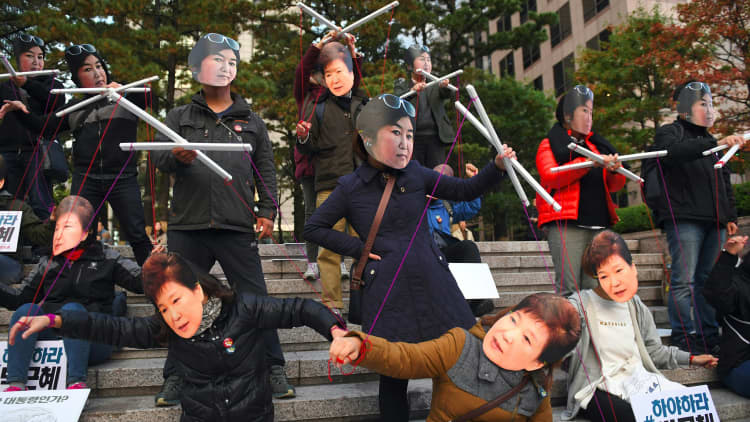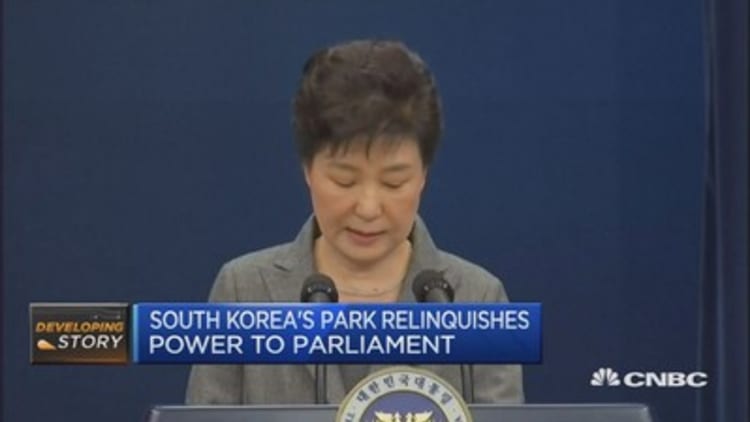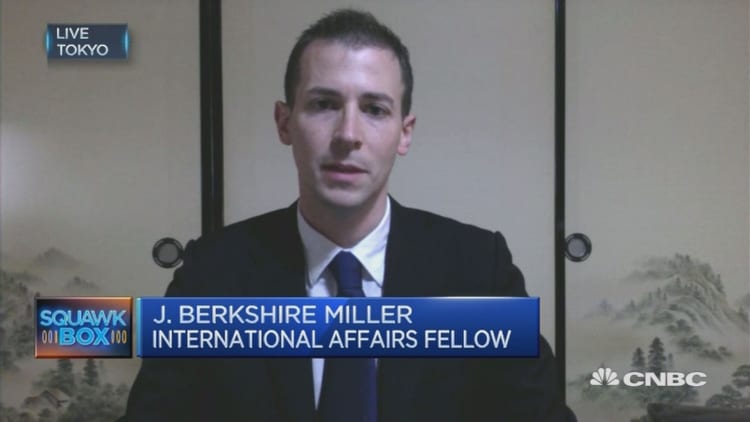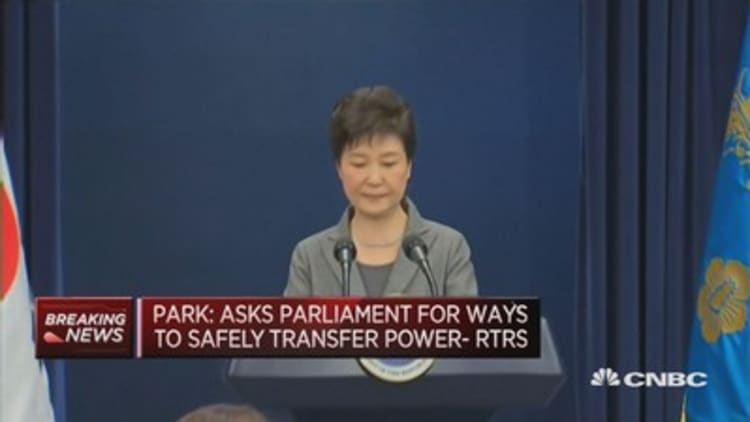
South Korean President Park Geun-hye relinquished her powers in a public announcement on Tuesday but stopped short of outright resignation in a move that's set to leave the country in political paralysis.
"I will leave to parliament everything about my future, including shortening of my term," she said in a televised speech that followed five straight weekends of large-scale protests over her involvement in an influence-peddling scandal. Ahead of the speech, Yonhap News reported that Park was likely to give up some of her powers but refrain from resignation.
Park, 64, has been facing calls to resign or face impeachment for allowing a close friend, Choi Soon-Sil, to interfere in state affairs without security clearance. Choi, 60, has been charged with numerous offences, including abuse of authority, coercion, attempted coercion and attempted fraud.
Tuesday's announcement only exacerbated the nation's heightened level of political uncertainty, James Sullivan, head of equity research Asia ex-Japan at JP Morgan, said. "Now, we have a leader that has not stepped down and yet has effectively devolved power to other parties so it's unclear where we go from here.
Indeed, her speech did not provide much clarity, Jonathan Berkshire Miller, international affairs fellow at the Council on Foreign Relations, agreed. "Now that she's effectively ceded all her power to parliament, who will be in charge? This ambiguity won't be good for markets and it won't quash protests."
It's expected that Prime Minister (PM) Hwang Kyo-ahn would take charge but political infighting has complicated the matter.
Park installed Hwang as PM on Nov. 2 as part of a cabinet reshuffle but because the opposition coalition does not like Hwang, Park is willing to withdraw her nominee.
"If parliament recommends a good person with an agreement between the ruling and opposition parties, I will appoint that person as prime minister and allow him to essentially take control over the cabinet," Park told parliament on Nov. 8. The Blue House, Korea's equivalent of America's White House, has asked parliament to propose a new prime-ministerial candidate but the opposition coalition has yet to form a consensus.
The fact that the Park did not formally step down was likely a legal manoeuvre to avoid prosecution; prosecutors labelled the head of state a co-conspirator with Choi on Nov. 20.
"Park has immunity from prosecution while in office but would lose that protection if she quits, increasing incentives for her to cling to power in the hopes that her fortunes improve," Scott Seaman, senior Asia analyst at Eurasia, said in a recent note.
Moreover, an outright resignation would have put her ruling Saenuri Party in danger. "It would have forced elections to happen in 60 days and Saenuri just doesn't have a suitable candidate to replace her. So this move buys her and Saenuri time," Miller explained.



Impeachment still on the table
Following Park's remarks, the opposition Democratic Party said it would continue with impeachment procedures, warning that her speech was a scheme to avoid impeachment, Yonhap News reported.
In Asia's fourth-largest economy, impeachment is a two-step process.
The motion first requires a two-thirds majority in parliament, or at least 200 out of the 300 votes. But because the opposition coalition possesses only 171 seats in total, it must reach out to Saenuri members to gather the necessary votes.
Once the motion is passed in parliament, Park's powers would be assumed by the PM.
Next, at least six of the nine judges on the Constitutional Court, an independent body that specializes in matters of the constitution, must approve the motion within the next 180 days.
That won't be easy, Seaman warned.
"The fact that most of the judges are considered politically conservative, with two of them having been appointed by Park and the other seven installed by former President Lee Myung-bak, has fuelled speculation that they may be biased in favour of protecting the office of the president—and Park," he said.
In 2004, the Constitutional Court overturned a motion to impeach President Roh Moo-hyun after deliberating for 64 days, but the extent of political pressure in Park's case would make it difficult for the court to block impeachment this time around, he added.
"Whereas polls showed around 70 percent of respondents opposed efforts to impeach Roh, sparking public protests against the NA, recent surveys show nearly 80 percent of respondents are in favour of giving Park the boot," Seaman said.
If the court approved the motion, the PM would serve as interim president until a presidential election is held within 60 days. But if the motion was dismissed, Park would remain in office with limited powers and elections would be held in December 2017 as originally scheduled.

